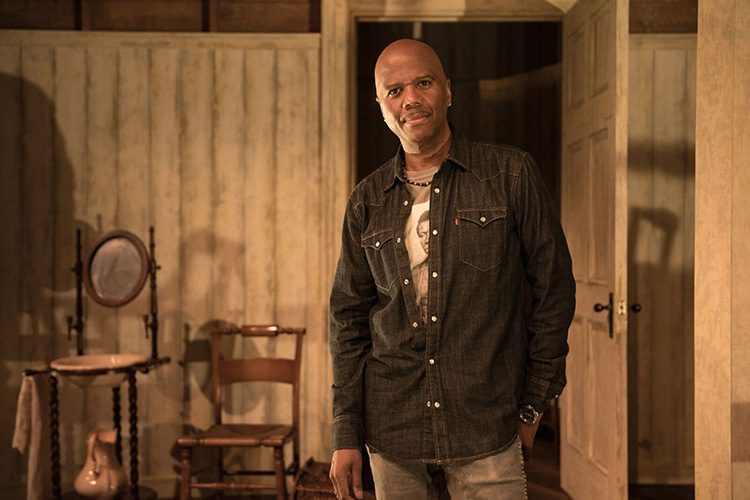A 1766 baptism — of Tim, listed as a “Negro child servant” to William Bennett of Connecticut — marks the first public record of Kyle Bass’s family in the United States.
“The story of Tim’s maturation under northern slavery, his desire for and gain of freedom, and his settlement and life in Delhi, N.Y., haunts and inspires me as a writer,” says Bass, who has taught Colgate’s Playwriting course in the Department of Theater since 2011.
Through researching and writing a work that tells Tim’s story — his own family’s history — Bass, a playwright, is bringing to light the little-explored subject of slavery’s impact in upstate New York. The Frankfort, N.Y., native holds the Gretchen Hoadley Burke ’81 Endowed Chair in Regional Studies, which supports outstanding scholarship on the upstate region, for 2018–19. Colgate’s Upstate Institute facilitates the selection of the Burke Chair annually and supports Burke Chair related events.
Bass, who says his family “has been owning land and voting since the late 1700s,” notes that his project builds upon research conducted by his cousin, Colgate Trustee Emerita Diane Ciccone ’74, P’10. His work as a dramatist is “about wrestling with facts and history, to find an effective story to tell a wider truth. Facts are what happened. The truth is what we understand about what happened. That’s why everybody’s truth is different about the same facts. Ask your sibling about your childhood. Your brother will tell you a very different story.”
Bass’s most recent play, Possessing Harriet, is also based on real-life upstate events and tells a wider truth about race, identity, equality, and the meaning — and price — of freedom. In Peterboro, N.Y. (just 15 miles from Colgate), in 1839, Harriet Powell, a young, mixed-race enslaved woman on the run, awaits cover of darkness with her rescuers. Through impassioned, poetic dialogue with Thomas Leonard, a free black man working the Underground Railroad; wealthy abolitionist Gerrit Smith, whose attic provides temporary shelter; and Smith’s young cousin, the vocal women’s equality advocate Elizabeth Cady (later Stanton), Powell grapples with the ramifications of her escape and deciding to continue her journey to Canada.
More than 200 Colgate students — from theater, film and media studies, history, education, geography, and Core 151 classes — saw Possessing Harriet in October when it premiered at Syracuse Stage, where Bass is the associate artistic director. The play’s premiere provided perfect timing for Bass’s appointment to Colgate’s Burke Chair, which, in addition to research support, includes giving a public lecture and teaching two courses.
His campus public lecture took place before students traveled to see Possessing Harriet. Two of the actors, Nicole King (Harriet Powell) and Lucy Lavely (Elizabeth Cady), performed a scene and Bass discussed his five-year writing process. Of the play’s depiction of young people — close in age to the students — “living in enormous circumstances” nearly 200 years ago, says Bass, “It seemed to resonate. It meant something to them in 2018. That was lovely to see, because there’s no reason to write about the past if you can’t do that to talk about the present.”
After letting the play and his lecture marinate since the fall, students in two spring courses are delving into their own creative explorations of truth. In his Research Seminar in Dramatic Writing, Bass has students asking, “How do we look at facts to fuel our fiction? More than this date, this time, this place, these people, how do you turn facts into truth?” In Playwriting, he says, “I’m asking students to take risks, in the ways in which we express ourselves, tell ourselves who we are, and let others know who we are. Go inside yourself, and make that interior discovery exterior. When it excites you in the writing, that comes alive for the audience.”

